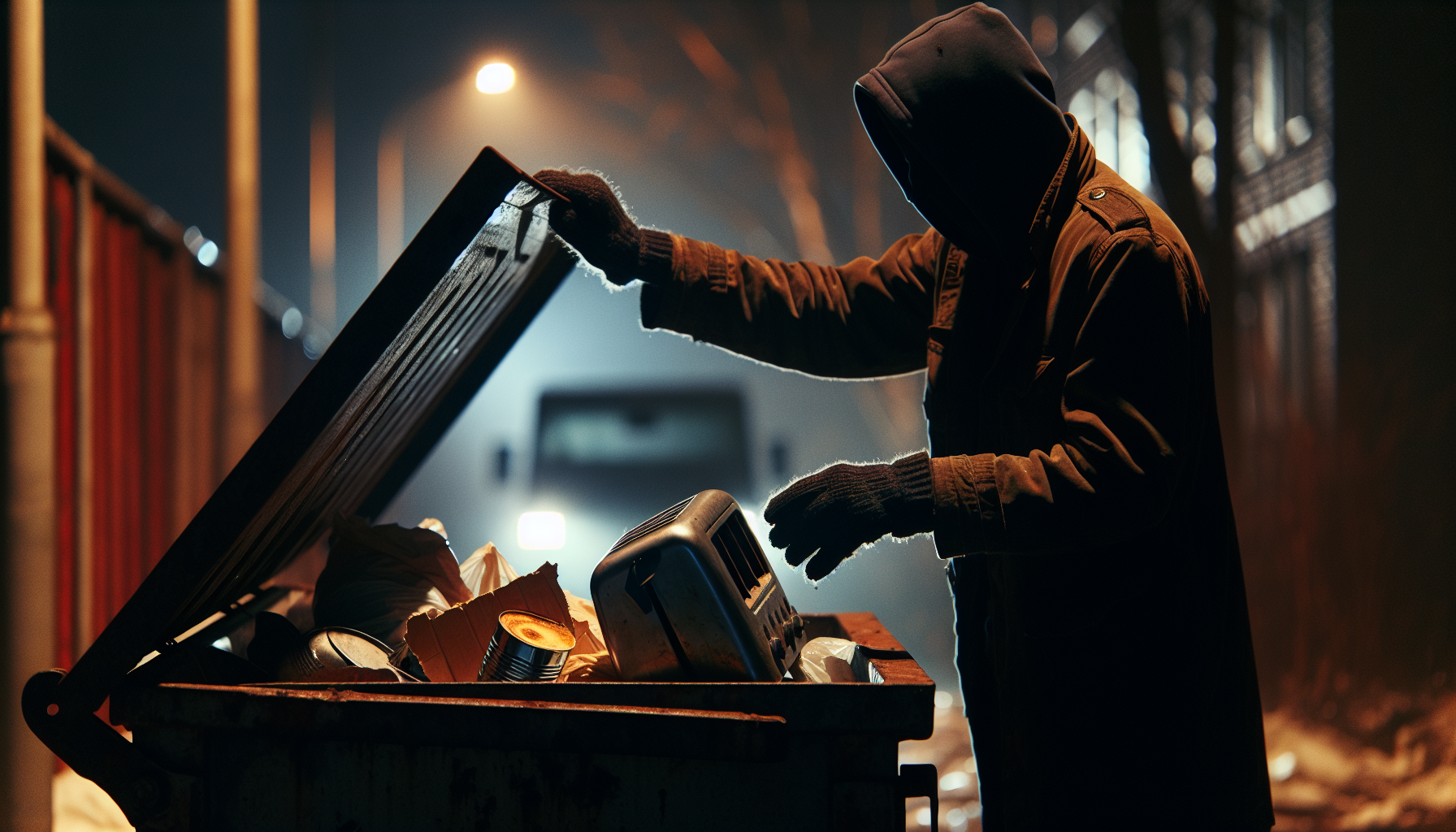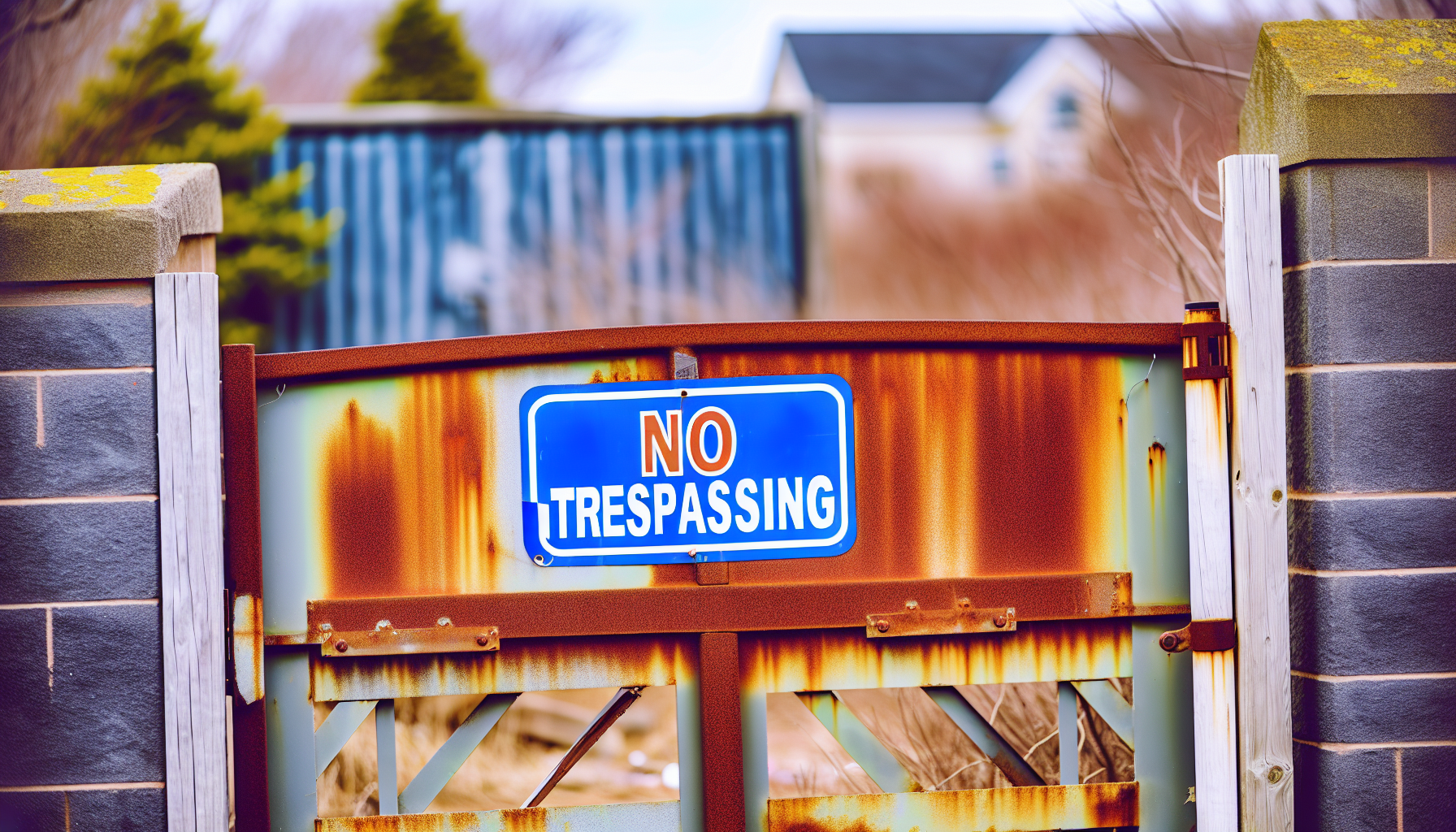In a world consumed by consumerism and excess waste, many individuals have turned to dumpster diving as an alternative way of obtaining goods.
But with this alternative method comes a nagging question – is it illegal?
The practice of scavenging through dumpsters may seem straightforward, but the legality behind it is not so black and white.
In fact, there are numerous factors that determine the legality of dumpster diving, including location, property ownership, and even local ordinances.
As such, the answer to whether or not dumpster diving is illegal can be complex and confusing for those interested in practicing it.
In this blog post, we will delve into the truth behind dumpster diving laws in 2024 to help shed light on this topic and provide clarity for those considering taking part in this controversial trend.
So let’s dive in (pun intended) and uncover the real story behind dumpster diving!
Dumpster Diving Key Takeaways
- Dumpster diving might be legal, thanks to a 1988 Supreme Court ruling. However, it’s crucial to follow local laws and respect private property, which may have specific rules.
- Be cautious about trespassing. Entering private property, ignoring ‘No Trespassing’ signs, or causing a disturbance can turn dumpster diving into illegal activities, leading to fines or arrest.
- Consider ethics in dumpster diving. Especially regarding food safety and identity theft concerns. Divers should handle sensitive information responsibly and be aware of the potential impact on businesses and individuals.
Navigating the Legality of Dumpster Diving

Did you know that dumpster diving is actually considered legal?
Surprisingly, the Supreme Court ruled in 1988 that as long as it doesn’t violate any local laws, going through someone’s trash is permissible.
So if you come across commercial or residential waste in a public area and no one claims ownership of it, feel free to dive right in!
Things can get tricky when considering different areas’ “Garbage Ordinances.”
These ordinances may impose restrictions on dumpster diving despite the approval from the highest court.
That’s why it’s important to research and be aware of your city or county regulations before embarking on your urban treasure hunt.
And remember – not every dumpster is up for grabs.
Respect private property to avoid getting into legal trouble with this technically legal activity.
The Supreme Court’s Stance on Discarded Waste
The 1988 decision of the Supreme Court had a significant impact on dumpster divers.
It established that this activity is allowed, as long as it does not violate any local regulations.
This ruling was based on the idea that once something is thrown away, it becomes part of public property and loses its privacy.
If you are tempted to search through discarded food or curious about someone else’s garbage, remember that the Supreme Court endorses your pursuit.
As long as you do not go against any federal or regional laws, there should be no limitations in exploring abandoned waste items!
Always double-check local ordinances since they can vary greatly from one place to another.
Local Laws and Garbage Ordinances
While the Supreme Court’s decision lays out a general framework for dumpster diving, there are also local regulations and garbage ordinances that play a role.
These additional rules may place restrictions on diving into dumpsters, so it is important for divers to do their research beforehand.
So how can you learn about the laws in your specific area regarding dumpster diving?
You have several options.
- Look up the laws of your state.
- Visit relevant websites provided by both state and county governments.
- From there, search for information pertaining to your own region specifically such as city codes or town ordinances related to dumpster diving.
When Dumpster Diving Becomes Trespassing

While it may be technically legal to engage in dumpster diving, this does not mean that you can freely access any and every dumpster.
Trespassing on private property while engaging in dumpster diving could result in serious legal consequences.
Disregarding warning signs or locks on dumpsters is also a risky move.
If the allure of a particular dumpster catches your eye, make sure to respect the boundaries set by its status as private property.
If there is any doubt about whether or not you have permission to dive into a certain area’s dumpsters, it is always best to err on the side of caution and ask for clarification first.
It’s better safe than sorry when avoiding potential tickets or even arrest due to trespassing charges while trying out this hobby.
Identifying Off-Limits Areas
When trying to determine if a dumpster is off-limits, it’s important to pay attention to signs that warn against diving.
“For Your Safety No Dumpster Diving” and “Private Property” are examples of these indicators, as they suggest potential dangers and boundaries.
Other warnings like “No Trespassing” or any indication that the dumpster is not for public use should also be taken seriously. Locks on dumpsters clearly show restricted access.
Remember that private property doesn’t just refer to homes and buildings.
It can include fenced-off areas, closed gates, or anywhere with limited entry points.
Unauthorized diving in dumpsters located on such properties may be considered trespassing.
Consequences of Ignoring Such Signs
Disregarding warning signs or illegally entering an area while dumpster diving can lead to serious consequences.
These may include receiving a penalty fee, being issued citations, or even facing arrest for trespassing.
In the United States, fines for trespassing vary between $25 and $1,000 depending on the circumstances of the violation.
In some states where it is considered a more severe offense, ignoring visible ‘No Trespassing’ signs could result in imprisonment for up to 180 days.
When engaging in dumpster diving activities next time, be mindful of any posted warnings and avoid putting yourself at risk unnecessarily.
Disorderly Conduct and Dumpster Diving

While participating in dumpster diving, it’s important to be aware that your actions may be considered disorderly conduct in certain situations.
This can encompass things such as leaving a mess in public areas or illegally disposing of garbage.
Even innocent behaviors like driving near a dumpster could attract the attention of law enforcement and potentially result in charges for disorderly conduct.
Although it might not seem serious at first glance, disorderly conduct has legal consequences.
Depending on the gravity of the offense, you could receive a warning or citation from authorities.
More severe cases may even lead to arrest.
Avoiding Actions That Attract Police Attention
Participating in dumpster diving may seem like a harmless activity, but it is important to be aware of potential actions that could bring unnecessary police attention.
For instance, using a vehicle or parking too closely to a dumpster can cause suspicion and potentially result in the involvement of law enforcement.
So how do you avoid drawing unwanted police attention while dumpster diving? Here are some tips:
- Keep noise levels low and refrain from leaving behind any mess.
- If planning on going with others, try to keep the group small and discreet.
- Dress inconspicuously when engaging in this activity.
- Dive during early hours when there is less foot traffic around.
Dumpster Diving and Identity Theft Concerns

Although dumpster diving may appear to be a fun activity for some, it raises significant concerns regarding identity theft.
The personal information that can be found in dumpsters has the potential to be used illegally, resulting in serious consequences for innocent victims.
From hospital records to discarded statements of credit card transactions, dumpsters can often hold valuable resources for thieves seeking identities.
It is essential as a dumpster diver to handle such information responsibly and refrain from using any acquired personal details for unlawful purposes.
Protecting Yourself and Others from Information Theft
As a dumpster diver, it is your responsibility to avoid contributing to the issue of information theft.
If you come across any personal or confidential data while diving, ensure its secure disposal in order to prevent unauthorized access.
A reliable method for achieving this is by shredding all sensitive documents before disposing of them.
This makes it significantly more difficult for potential thieves to reconstruct and exploit the information.
By taking these precautions, you can help safeguard yourself and others from the dangers associated with information theft.
The Ethics of Dumpster Diving: Food and Recyclable Items

Dumpster diving goes beyond the search for hidden treasures.
It is also about maximizing resources and reducing waste.
When it comes to dumpster diving for food or recyclable items, there are ethical and legal considerations that must be taken into account.
This raises questions of whether or not dumpster diving is illegal, especially in relation to potential implications for those who work in waste removal.
On one hand, retrieving discarded food through dumpster diving can help combat excessive amounts of wasted food while providing sustenance for individuals in need.
Concerns over sanitation and health risks must also be considered.
As an alternative solution, charities have been successful at collecting excess edible goods from grocery stores, which address both issues surrounding unnecessary disposal as well as safety concerns.
Likewise, collecting valuable items from discarded waste has evolved into an income-generating activity for some individuals.
Nevertheless, it is crucial to stay updated on the precise recycling regulations established in your community.
Avoid places where thrift stores commonly refuse certain items because of loose rules about how much they weigh compared to their value in the secondary market.
Dumpster Diving for Food Items
Dumpster diving for food has become a popular method to address waste, utilize discarded resources, alleviate food insecurity and save money.
To its potential benefits in tackling waste and raising awareness about the environmental impact of wastefulness, dumpster diving also presents itself as a multifaceted issue that carries both social and ecological implications.
Beneficial it may seem at first glance though, there are inherent dangers associated with dumpster diving for food such as exposure to harmful bacteria, pesticides or chemicals found in spoiled items.
Consequently, this makes it essential for those who choose this practice to be vigilant about these risks by taking necessary precautions when collecting edible items from dumpsters.
In summary, while dumpster divers aim to reduce waste through scavenging useful sustenance they perceive is being recklessly thrown away without any consideration towards need.
Collecting Recyclable Items for Extra Cash
Similar to searching for food, dumpster diving is also a popular activity among individuals looking for recyclable items.
These can range from aluminum cans and plastic bottles to cardboard boxes and even electronic waste or scrap metal. Some people engage in this practice with a trash bag while hovering near dumpsters.
Just like with scavenging for food, there are legal considerations when it comes to dumpster diving for recyclables.
In certain cities or counties, going through residential or commercial trash bins may be prohibited by law.
It’s crucial to understand these regulations and ensure that no laws are being broken during the pursuit of valuable materials.
When it comes down to legality aside though, exploring dumpsters remains an effective way of finding discarded but useful objects such as those that can be recycled, including paper products too!
So if you’re interested in venturing into this type of unconventional collecting adventure keep your eyes open around locations containing large amounts of garbage receptacles since they might very well hide profitable gems right within reach.
The Impact of Dumpster Diving on Businesses
Dumpster diving has consequences beyond just the individuals who engage in it.
Businesses are also significantly affected by this activity, facing potential liability issues and damage to their reputation.
For some businesses, dumpster diving can be a major inconvenience or even pose a threat if it disrupts their operations or attracts unwanted attention.
Others may view it as an opportunity to contribute towards waste reduction and environmental sustainability.
Regardless of perspective, businesses must consider the impacts of dumpster diving on their premises and take appropriate measures to manage such activities effectively.
Business Liability and Dumpster Diving
One of the biggest concerns for businesses when it comes to dumpster diving is liability.
If a dumpster diver gets injured while diving in a business’s dumpster, the business could potentially be held liable, particularly if they were found to be negligent in some way.
To mitigate this risk, businesses can take steps to secure their dumpsters and reduce the likelihood of injury.
This could include locking dumpsters, erecting barriers to prevent unauthorized access, and posting signs warning against dumpster diving.
By taking these precautions, businesses can reduce their liability risk and help ensure the safety of both their employees and the public.
How to Dumpster Dive Responsibly and Legally
Dumpster diving can be an enjoyable and potentially rewarding activity, but it’s important to do so responsibly and within legal boundaries.
This means respecting private property, obtaining permission when necessary, and adhering to local laws.
It is crucial to keep in mind that just because something has been thrown away does not automatically make it available for taking.
Engaging in dumpster diving requires navigating a complex landscape of both legal and ethical considerations.
By understanding these factors, individuals can ensure their actions are responsible, respectful of others’ properties while staying compliant with the law.
Seeking Permission: A Key to Legal Dumpster Diving
Gaining permission is a crucial element in responsible and lawful dumpster diving, especially when it involves dumpsters on private property.
The first step to obtaining consent is simply reaching out to the owner of the dumpster and requesting access.
If they decline, it’s important to respect their decision and move on. Remember that respecting others’ rights is key in maintaining legal and respectful behavior while engaging in dumpster diving.
Frequently Asked Questions
Which states is dumpster diving legal?
Dumpster diving is permitted in all 50 states due to the precedent set by the Supreme Court’s ruling on California vs. Greenwood, which declared that there can be no expectation of privacy for items found in a dumpster located on public property.
Once a trash bag has been placed outside and onto the curb for collection, it becomes part of the public domain and may be legally accessible through activities such as dumpster diving.
Can you dumpster dive in MA?
Massachusetts does not have any laws preventing dumpster diving, so it is perfectly legal to do so in this state. There are no restrictions or regulations that prohibit the act of searching through dumpsters for discarded items.
Individuals can freely engage in dumpster diving.
Should you ask permission to dumpster dive?
Yes, you should ask for permission to dumpster dive, especially on private property, to avoid potential legal consequences such as fines or arrests.
Always seek permission from the property owner or relevant authorities before diving in.
Is it illegal to dumpster dive in the state of Georgia?
In the state of Georgia, diving into dumpsters is not against the law. It may be considered trespassing if you enter a restricted area in order to reach the dumpster without obtaining permission.
It is important to adhere to regulations and take precautions while engaging in this activity.
Is dumpster diving legal?
The act of dumpster diving is not prohibited under federal law, although it may be limited by local regulations. Before engaging in this activity, it is important to research and comply with any applicable laws at the municipal level regarding diving into dumpsters for discarded items.
Summary
In summary, engaging in dumpster diving is a multi-dimensional activity that treads the fine line between legality and illegality, morality and necessity.
Whether one dives for sustenance or recyclables or simply for the thrill of it all, it is essential to be aware of laws pertaining to this practice as well as showing respect towards private property.
Permission must always be sought when required.
Dumpster diving may offer an exhilarating experience, but should still be approached with caution while keeping in mind its potential risks and rewards.
So next time you come across a trash bin remember – behind its appearance lies complex dynamics involving lawfulness, ethics, and survival.
